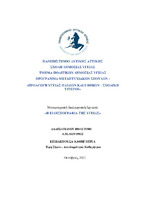| dc.contributor.advisor | Σίμου, Ευστρατία | |
| dc.contributor.author | Αλατσατιανού, Πολυτίμη | |
| dc.date.accessioned | 2022-12-08T09:01:12Z | |
| dc.date.available | 2022-12-08T09:01:12Z | |
| dc.date.issued | 2022-11-30 | |
| dc.identifier.uri | https://polynoe.lib.uniwa.gr/xmlui/handle/11400/3450 | |
| dc.identifier.uri | http://dx.doi.org/10.26265/polynoe-3290 | |
| dc.description.abstract | Εισαγωγή: Ο αντίκτυπος των ειδήσεων επηρεάζει σε σημαντικό βαθμό την ποιότητα ζωής του πληθυσμού ιδιαιτέρως όσων αφορούν την υγεία. Η πληθώρα πληροφοριών για υγειονομικά θέματα σε ιστοτόπους, η αλόγιστη εισροή στοιχείων και γνωματεύσεων και η δημοσίευση τους από μη έγκυρες και αξιόπιστες πηγές, τα fake news και τα φαινόμενα παραπληροφόρησης
επηρεάζουν το ευρύ κοινό και τις αποφάσεις που λαμβάνει για την υγεία. Σκοπός: Σκοπός της ερευνητικής εργασίας είναι να αποτυπώσει την επίδραση των ψευδών ειδήσεων που διαδίδονται στο διαδίκτυο στις συμπεριφορές υγείας του πληθυσμού και να
αναδείξει στρατηγικές που θα οδηγήσουν στην εξάλειψη του φαινομένου. Το πρόβλημα έγινε ακόμη πιο έντονο τα τελευταία δυο χρόνια με την εμφάνιση του COVID-19. Για το λόγο αυτό πολλές από τις συμπεριλαμβανόμενες μελέτες αναφέρονται στη συγκεκριμένη περίοδο. Μέθοδος: Βιβλιογραφική συστηματική ανασκόπηση στις βάσεις δεδομένων Pubmed, Wiley Online Libray, Sagepub (1η Ιανουαρίου 2011 – 31η Ιουλίου 2022) στην αγγλική γλώσσα. Αποτελέσματα: Αρχικά προέκυψαν 862 άρθρα εκ των οποίων τα 642 στη βάση αναζήτησης Pubmed, 218 στη Wiley online Library και 2 στη SagePub. Στη συνέχεια εξετάστηκαν εκ νέου
βάσει τίτλου και περίληψης και αποκλείστηκαν τα 405. Προέκυψαν 218 για πλήρη ανάγνωση εκ των οποίων επιλέχθηκαν 15 που πληρούσαν επακριβώς τα κριτήρια. Όλες οι μελέτες που συμπεριλήφθηκαν έχουν δημοσιευτεί τη χρονική περίοδο 2011 έως 2022 και αφορούν δημοσιογράφους και επαγγελματίες υγείας καθώς και ασθενείς. Από τα αποτελέσματα προέκυψε ότι η πρόσβαση σε ψευδείς ειδήσεις οφείλεται στον χαμηλό αλφαβητισμό υγείας του γενικού πληθυσμού, στη συναισθηματική νοημοσύνη του ατόμου και επηρεάζει τη δημόσια υγεία σε μεγάλο βαθμό, ώστε κοινωνικές ομάδες να στραφούν ενάντια σε ιατρικές – επιστημονικές πρακτικές ευεργετικές για την ποιότητα ζωής. | el |
| dc.format.extent | 129 | el |
| dc.language.iso | el | el |
| dc.publisher | Πανεπιστήμιο Δυτικής Αττικής | el |
| dc.rights | Αναφορά Δημιουργού - Μη Εμπορική Χρήση - Παρόμοια Διανομή 4.0 Διεθνές | * |
| dc.rights.uri | https://creativecommons.org/licenses/by-nc-sa/4.0/deed.el | * |
| dc.subject | Υγεία | el |
| dc.subject | Παραπληροφόρηση | el |
| dc.subject | Ψευδείς ειδήσεις | el |
| dc.subject | Εμβολιασμοί | el |
| dc.subject | Ασθενείς | el |
| dc.subject | Κοινωνικά δίκτυα | el |
| dc.subject | Δημοσιογράφοι υγείας | el |
| dc.subject | Health | el |
| dc.subject | Misinformation | el |
| dc.subject | Fake news | el |
| dc.subject | Vaccinations | el |
| dc.subject | Social media | el |
| dc.title | Η ειδησεογραφία της υγείας | el |
| dc.title.alternative | Health news | el |
| dc.type | Μεταπτυχιακή διπλωματική εργασία | el |
| dc.contributor.committee | Fouskas, Theodoros | |
| dc.contributor.committee | Tsimtsiou, Zoi | |
| dc.contributor.faculty | Σχολή Δημόσιας Υγείας | el |
| dc.contributor.department | Τμήμα Πολιτικών Δημόσιας Υγείας | el |
| dc.contributor.master | Δημόσιας Υγείας | el |
| dc.description.abstracttranslated | Introduction: The impact of the news significantly affects the quality of life of the population, particularly those related to health. The abundance of information on health issues on websites, the reckless influx of data and opinions and their publication from invalid and reliable sources, fake news and misinformation phenomena affect the general public and the decisions they make
about their health. Purpose: The purpose of the research work is to capture the effect of fake news spread on the internet on the health behaviors of the population and to highlight strategies that will lead to the elimination of the phenomenon. The problem became even more acute in the last two years with the emergence of COVID-19. For this reason, many of the included studies refer to this specific period. Method: Bibliographic systematic review in the databases Pubmed, Wiley Online Libray, Sagepub
(January 1, 2011 – July 31, 2022) in English language. Results: 862 articles were initially retrieved, of which 642 were in the Pubmed search database, 218 in the Wiley online Library and 2 in SagePub. They were then rescreened by title and abstract
and 405 were excluded. 218 were obtained for full reading from which 15 were selected that exactly met the criteria. All included studies were published between 2011 and 2022 and involved journalists and health professionals as well as patients. The results showed that access to fake news is related to the general population's low health literacy, emotional intelligence of the
individual and affects public health to a great extent, so that social groups turn against medical scientific practices beneficial for the quality of life. | el |


